Gut health plays a pivotal role in the overall well-being of dogs. A healthy gut not only aids in digestion but also significantly impacts a dog's immune system, mood, and even its behavior.
However, just like humans, dogs can experience gut issues that may lead to a range of health problems. These issues can stem from various factors, including poor diet, overuse of antibiotics, and exposure to environmental toxins. Restoring and maintaining gut health is, therefore, essential for ensuring that your dog lives a long, happy, and healthy life.
Signs of an Unhealthy Gut
Before diving into the steps to restore gut health, it’s crucial to recognize the signs that may indicate your dog’s gut is out of balance. Some common symptoms include chronic diarrhea or constipation, excessive gas, bloating, and vomiting. Behavioral changes such as irritability or lethargy can also be linked to poor gut health. Additionally, if your dog frequently suffers from infections or skin conditions, it could be a sign of a compromised immune system, often rooted in gut health issues.
Step 1: Evaluate and Improve Your Dog's Diet
The first and most critical step in restoring your dog’s gut health is to evaluate and improve its diet. Many commercial dog foods contain fillers, artificial ingredients, and preservatives that can harm your dog’s digestive system. Switching to a high-quality, balanced diet made with natural, whole foods is essential. Consider feeding your dog a diet rich in animal protein, healthy fats, and fibrous vegetables. Avoid foods that contain grains, as they can be difficult for dogs to digest and may contribute to inflammation in the gut.
Feeding your dog a species-appropriate diet is critical for maintaining gut health. Dogs are carnivores by nature, and their digestive systems are designed to process a diet high in animal protein. A raw or lightly cooked diet that mimics what a dog would eat in the wild is often recommended for optimal gut health.
This type of diet typically includes raw meat, bones, and organs, which provide essential nutrients in their most bioavailable form. While transitioning to a raw diet can be daunting, it can yield significant benefits for your dog’s gut health. If a raw diet is not feasible, ensure that the food you choose is high in quality protein and free from fillers and artificial ingredients.
Introducing fermented foods, such as kefir or yogurt, into your dog’s diet can also be beneficial. These foods are rich in probiotics, which help to replenish the good bacteria in your dog’s gut. However, it’s important to choose plain, unsweetened varieties to avoid added sugars that can exacerbate gut issues.
Step 2: Introduce Probiotics and Prebiotics
Probiotics are live bacteria that provide numerous health benefits when ingested. For dogs with gut health issues, introducing a high-quality probiotic supplement can help restore the balance of good bacteria in their digestive system. Probiotics support digestion, boost the immune system, and can even improve your dog’s mood and behavior.
In addition to probiotics, prebiotics are also essential. Prebiotics are a type of fiber that feed the beneficial bacteria in the gut, helping them to thrive. You can find prebiotics in foods like bananas, apples, and asparagus, or you can choose a supplement specifically designed for dogs. Combining probiotics and prebiotics creates a synergistic effect that supports overall gut health and function.
Step 3: Consider the Role of Digestive Enzymes
Digestive enzymes are another essential component in restoring gut health. These enzymes help break down food more efficiently, allowing your dog to absorb nutrients better. When the gut is compromised, the production of digestive enzymes may decrease, leading to poor digestion and nutrient absorption.
Supplementing with digestive enzymes can aid in the breakdown of proteins, fats, and carbohydrates, reducing the strain on your dog’s digestive system. This is especially beneficial for older dogs or those with chronic digestive issues. Digestive enzyme supplements are available in various forms, including powders and capsules, making them easy to incorporate into your dog’s diet.
Step 4: Minimize the Use of Antibiotics and Medications
While antibiotics and other medications can be necessary for treating certain conditions, they can also wreak havoc on your dog’s gut health. Antibiotics, in particular, not only kill harmful bacteria but also wipe out beneficial bacteria, disrupting the delicate balance in the gut. If your dog has been on antibiotics, it’s vital to take steps to restore its gut flora as soon as possible.
Whenever possible, explore natural alternatives to antibiotics and medications. For example, certain herbs and supplements have antimicrobial properties that can help fight infections without the harsh side effects of antibiotics. However, always consult with your veterinarian before making any changes to your dog’s treatment plan. If antibiotics are necessary, ensure you’re following up with a robust probiotic regimen to help rebuild the beneficial bacteria in your dog’s gut.
Step 5: Provide Regular Detox Support
Dogs are exposed to toxins daily, whether through their food, water, environment, or even the products we use on them. These toxins can accumulate in the body and negatively impact gut health. Regular detoxification can help remove these harmful substances and support a healthy gut.
Detoxing doesn’t have to be complicated. You can support your dog’s natural detoxification processes by providing clean, filtered water, feeding them a diet free of pesticides and chemicals, and using natural grooming products. Additionally, certain supplements, such as milk thistle, can help support liver function, aiding in the detoxification process.
Incorporating foods like leafy greens, beets, and dandelion greens into your dog’s diet can also support detoxification. These foods are rich in antioxidants and other compounds that help the body eliminate toxins more effectively.
The Road to Gut Health: Patience and Persistence
Restoring your dog’s gut health is not an overnight process; it requires time, patience, and consistency. By following these five steps—removing harmful foods, incorporating probiotics and prebiotics, using digestive enzymes, feeding a species-appropriate diet, and managing stress—you can significantly improve your dog’s gut health.
Remember that every dog is unique, and what works for one may not work for another. Monitor your dog’s progress closely, and don’t hesitate to seek professional advice if needed. A healthy gut is the foundation of a healthy dog, leading to better digestion, a stronger immune system, and overall well-being.
As you embark on this journey to restore your dog's gut health, keep in mind that the effort you put in now will pay off in the long run, giving your furry friend the best chance at a long, happy, and healthy life.






Share:
Can Dogs Eat Mushrooms? A Comprehensive Guide to Safe and Toxic Varieties
Manuka Honey for Dogs: A Natural Remedy with Powerful Benefits